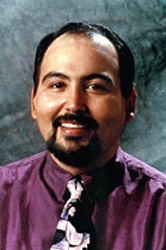|
 |
| Rex Allen Rock, Sr. |
 |
Born: August 7, 1960, in North Pole, Alaska
Parents/Relatives: Raised by grandparents, Allen and Frances Rock
Place of residence: Point Hope, Alaska
Native Heritage: Inupiaq
Schooling: Attended University of Alaska Fairbanks
Occupation: Whaling Captain; President of Tikigaq Corporation, village corporation of Point Hope; head basketball coach for Point Hope High School
Family: Married with four kids
Interviewed: January 20, 1999
I was born in North Pole and then adopted out to my parents, Elijah and Dorcas. Elijah is from Point Hope; Dorcas is from Barrow. But I was raised by my grandparents from the git-go, Allen and Frances Rock, and I grew up in the Village of Point Hope. I’ve been there almost all of my life.
Our culture’s real rich as far as whaling goes. There’s so much respect for the bowhead whale. Basically, that’s what our community’s based around. What I’ve learned -- what I grew up with and maintained -- is sharing. You don’t get the whale. It comes to you. That’s what I’ve been taught.
There’s just so much respect for the whale. Nothing’s left on the ice. Once it’s landed, everything is taken. Things like, you put the whale’s skull back in the water. That, in itself, asks for the spirit to come back next spring. And you still do that to this day. A lot of things that we do are not written, but passed on.
There is no "I" in the corporation, it’s all "we." And if you can pass that on to the people that you have, everything’s going to work smoothly. That’s how I feel. We have a real decent board at Tikigaq. If you look around the table, there are a lot of whaling captains. Because they are well respected.
We’ve had to educate them into the business world, but even in the business world it takes a lot of common sense. And they have that. You go out whaling, those people are well respected. And what they say is what you do. And that goes right on to the boardroom. There’s a lot of respect. And if you’re honest and up front with them, everything will go smoothly. It’s just those same values I bring in from out there on the ice, whaling. You drop everything from during the year. You might have some squabbles. But all that is dropped during whaling to land the whale, which means so much to the community. If we don’t get a whale, the village is not going to function. There’s just so much culture behind it. You can feel the tension in the air if there’s not one landed. Once that’s landed, it’s gone. It’s like somebody burst a big balloon.
As I said earlier, we try to pass on to our people in the corporation the working together. Because when we’re out there, we work as one. We want to pass that on in the corporate world. Then everything will be just fine. It’s a growing experience. But it’s been fun. I’ve enjoyed it. I’ve always kept those values with me.
What I’ve found out in the corporate world – there’s just so much emphasis on "I," "me." It’s just not the same. When you’re out whaling and you tell somebody you’re going to do this or they’re going to do it, you trust that they’re going to get it done. And the corporate world’s just a little different. As far as corporations go, I had mixed feelings. I didn’t want to get involved because I knew that at times it can be ugly.
Was there a point when you were growing up that you had a sense of being an Alaska Native?
From the git-go. I think from when I was nine, 10 years old, my grandfather would sit me down on the ice. He talked about the whale, why he got it, how he was so lucky. And he just told me, "This is what you’re going to be. This is what you’re about."
Your Native hero?
I guess my main hero would be the whaling captains. No specific one, but who and what they are about. That’s my hero. Because they’re not about themselves. They’re about the people.
And by the same token, I’ve been trying to tell my people when the kids come back, there is this jealousy factor. But they’re the same people. Even our own people need to learn to accept them instead of being jealous. Instead of being afraid that this kid’s coming back to take my job, we have to open our arms and say, "Here, come on in. You went out there. You sacrificed, and if you feel strongly you want to come back and work for your people, get in here."
Copyright © 2000, The Ciri Foundation, all rights reserved
|
 |
|




